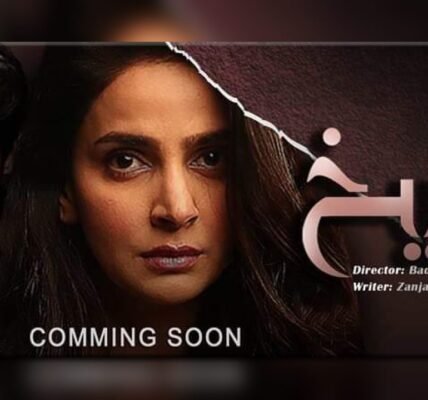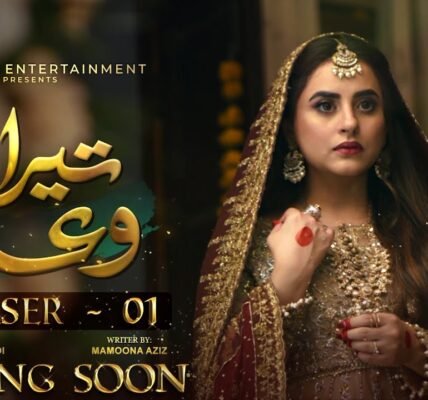Sabaat Drama Review, Cast ,Timings, Ratings, Director
Sabaat Drama Review, a highly anticipated Pakistani drama that aired in 2020, quickly captured the attention of audiences with its engaging plot, well-rounded characters, and powerful themes. The show, produced by Momina Duraid under the banner of MD Productions, aired on Hum TV, one of Pakistan’s most popular channels for quality dramas. It featured a stellar cast including Mawra Hocane, Ameer Gillani, Sarah Khan, and Usman Mukhtar. Directed by Shehzad Kashmiri, Sabaat was not just another mainstream family drama; it delved into themes of class differences, mental health, and the importance of staying true to one’s values.
In this in-depth review, we’ll explore Sabaat’s storyline, its powerful cast, the overall execution by the director, the production quality, and why the show resonated with its audience.
Storyline Overview
The storyline of Sabaat revolves around two main families: the Ali family and the Hassan family. It touches upon how wealth, power, and societal expectations influence relationships, personal growth, and mental health.
The drama primarily focuses on the lives of Hassan (played by Ameer Gillani) and Anaya (Mawra Hocane). Hassan belongs to an affluent family, with his father running a successful business. His sister, Miraal (Sarah Khan), is a dominating figure in the family, showcasing her narcissistic tendencies early on. Miraal, spoiled and entitled due to her privileged upbringing, exerts control over her family members, including her parents and especially her brother Hassan.
On the other hand, Anaya comes from a middle-class family and represents strong, independent, and progressive values. She is determined to make something of herself and is passionate about fighting social injustice.
The two protagonists, Hassan and Anaya, meet in university, and despite their different social standings, they fall in love and decide to get married. However, Miraal opposes this relationship fiercely due to her belief that Anaya is not “worthy” of their family’s status. This clash of ideologies between the controlling Miraal and the strong-willed Anaya forms the crux of the drama.
Simultaneously, the story dives deep into the mental health struggles of Miraal, who seeks therapy from Dr. Haris (Usman Mukhtar). This subplot of Miraal’s battle with her inner demons and her transformation through therapy was a fresh addition, bringing attention to a rarely discussed topic in Pakistani dramas – mental health.
Character Analysis
1. Hassan Ali (Ameer Gillani)
Hassan Ali is depicted as a loving son and brother, but his character struggles to assert himself against the overpowering influence of his sister, Miraal. Hassan is, at heart, a good person who wants to break free from the toxic chains of family expectations and forge his own identity. His character undergoes significant growth throughout the series, learning to stand up for what he believes in and fight for his love.
Ameer Gillani’s portrayal of Hassan was well-received, especially given that it was his first major acting role. His natural charm and on-screen chemistry with Mawra Hocane added depth to the character and kept the audience rooting for him.
2. Anaya (Mawra Hocane)
Anaya’s character represents the modern-day Pakistani woman: educated, independent, and resilient. Unlike the stereotypical portrayal of women in many dramas, Anaya stands up for herself and others, never letting circumstances break her spirit. Mawra Hocane shines in this role, bringing her character’s strength and vulnerability to life with a nuanced performance. Her relationship with her father, her fight for justice, and her dedication to her marriage made her a role model for many viewers.
3. Miraal (Sarah Khan)
Miraal is undoubtedly one of the most complex characters in Sabaat. Her obsessive need for control, her arrogance, and her resistance to accepting change make her a compelling antagonist. Sarah Khan’s performance as Miraal was praised widely for its intensity and depth. Miraal’s arc, particularly her gradual breakdown and eventual realization that she needs help, was one of the most gripping parts of the drama. The exploration of her mental health and therapy sessions with Dr. Haris added an element of psychological realism to her character, breaking away from the usual one-dimensional villains we see on television.
4. Dr. Haris (Usman Mukhtar)
Usman Mukhtar’s character, Dr. Haris, provided the necessary counterbalance to Miraal’s domineering personality. A calm, collected, and rational psychiatrist, Haris was instrumental in Miraal’s journey towards self-realization. His character also symbolized the importance of seeking help for mental health issues, which is still a stigma in many parts of South Asia. Usman Mukhtar’s understated performance resonated well with the audience, making Dr. Haris a character to remember.
Themes Explored in Sabaat
1. Class Divide
One of the most prominent themes in Sabaat is the class divide. The drama skillfully depicts the differences between the wealthy and the middle class, not only in terms of material possessions but also in values, outlooks on life, and interpersonal relationships. Miraal’s disdain for Anaya stems from this divide, while Anaya’s character embodies hard work, sincerity, and moral integrity.
2. Mental Health
A refreshing and progressive aspect of Sabaat was its focus on mental health. Miraal’s sessions with Dr. Haris showed a rare depiction of therapy in Pakistani media. The drama did not shy away from showing the nuances of mental health struggles, illustrating how even the most outwardly successful people can grapple with their inner turmoil. This portrayal was significant, as it helped to break down some of the stigmas associated with mental health care in Pakistani society.
3. Family Dynamics and Power Struggles
The complex family dynamics in Sabaat are central to its plot. Miraal’s toxic control over her family, particularly her brother, and the emotional toll it takes on everyone involved, is a stark representation of unhealthy family power structures. It also highlights how unchecked privilege and entitlement can ruin relationships and stunt emotional growth.
4. Female Empowerment
Anaya’s character embodies female empowerment, showing a woman who refuses to be silenced or oppressed by societal norms. She fights for her education, her career, and her right to marry the man she loves, despite opposition. Her character is a beacon of strength, especially in a media landscape that often portrays women as submissive or passive.
Direction and Production
Shehzad Kashmiri, the director of Sabaat, is known for his meticulous attention to detail, and this was evident throughout the drama. From the scenic shots of Islamabad to the way he captured intense emotional moments, Kashmiri succeeded in making Sabaat visually appealing and emotionally resonant. His direction ensured that the drama maintained a balance between its various themes without overwhelming the audience.
The production quality was top-notch, with high-quality sets, costumes, and cinematography that added to the drama’s allure. The music, composed by Farhan Saeed, especially the title track “Janiya,” became popular for its haunting melody and soulful lyrics, perfectly complementing the emotional tone of the show.
Ratings and Audience Reception
Sabaat received positive ratings throughout its run. The unique storyline, powerful performances, and its tackling of important issues like mental health and class differences set it apart from the typical fare on Pakistani television. Audience reviews on social media platforms like Twitter and Instagram were largely positive, with many praising Sarah Khan’s portrayal of Miraal and Mawra Hocane’s strong depiction of Anaya.
Critically, however, the show did face some backlash. Some viewers felt that the ending was rushed and did not give enough closure to certain characters, particularly Miraal. Others thought that the romance between Hassan and Anaya could have been better fleshed out.
Airing Timings and Ratings
Sabaat aired on Hum TV every Sunday at 8:00 PM, a prime slot that ensured maximum viewership. The drama garnered high TRPs (Television Rating Points) consistently, solidifying its position as one of the top dramas of 2020.
Conclusion
Sabaat was a thought-provoking and engaging drama that stood out in a crowded field of Pakistani serials. It dared to address difficult themes like mental health, class inequality, and family power dynamics, all while delivering strong performances from its talented cast. While it may have had its shortcomings, particularly in terms of pacing towards the end, its impact was undeniable. The drama’s message about the importance of self-realization, the dangers of unchecked privilege, and the need for empathy resonated with viewers and sparked important conversations, making it one of the most memorable shows of the year.
Sabaat will continue to be remembered for its bold storytelling, strong female characters, and its attempt to break the mold of conventional Pakistani dramas.
4o




